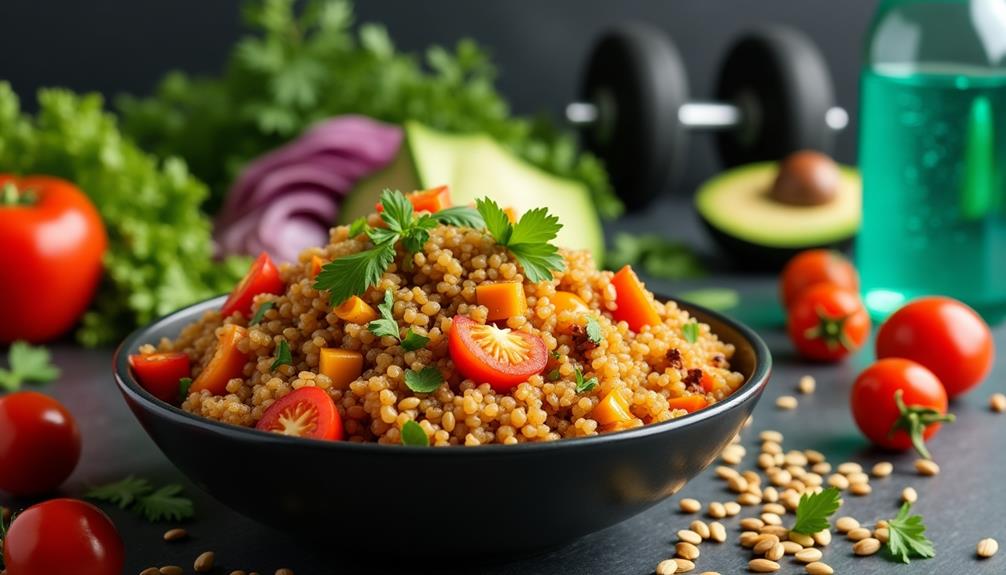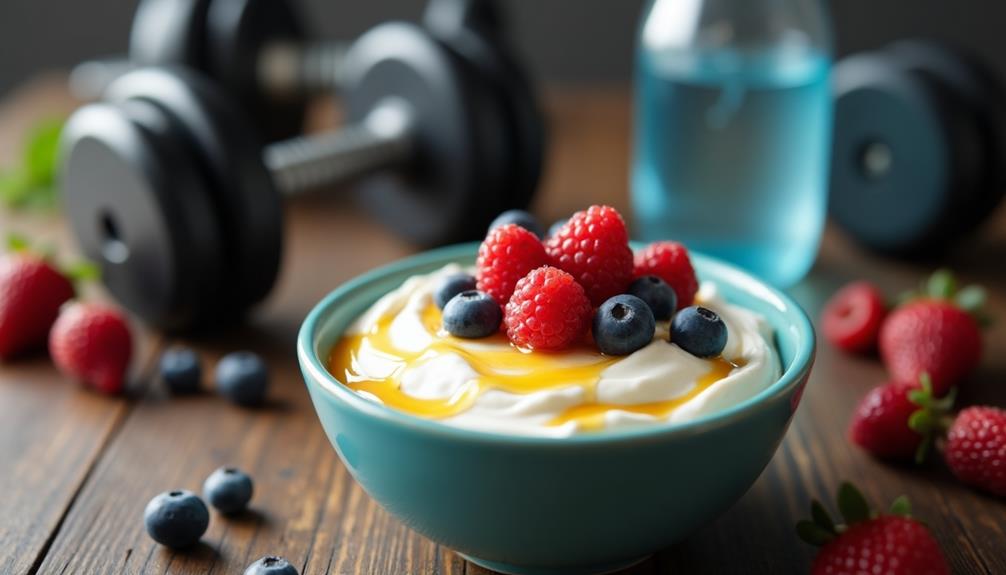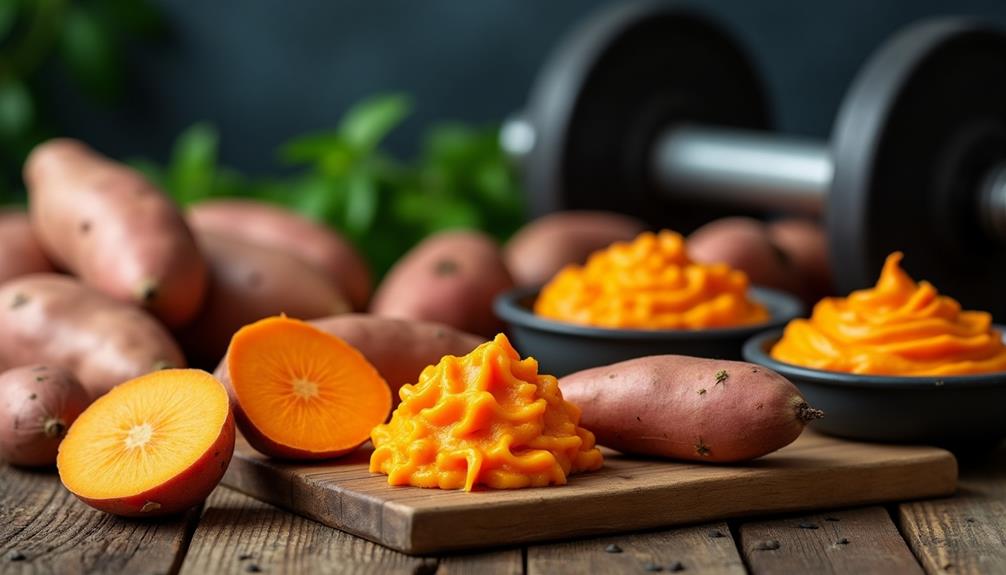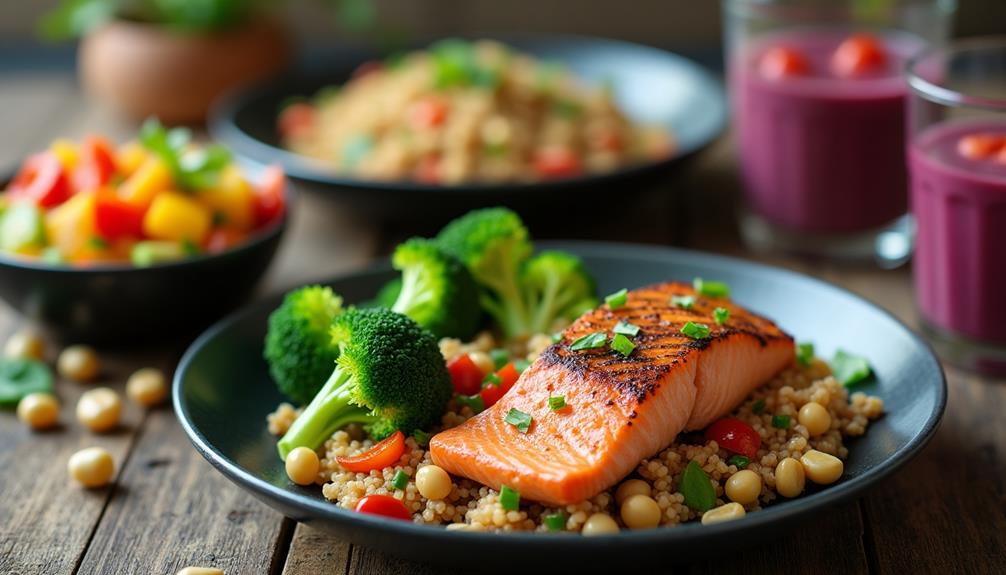If you want to enhance your recovery as a strength athlete, consider these top three foods:
Quinoa is a complete protein, packed with essential amino acids and fiber, perfect for muscle repair and digestion.
Greek Yogurt boasts high protein content along with probiotics for gut health, plus vitamin C for collagen support.
Sweet Potatoes serve as an excellent source of complex carbohydrates and vitamins A and C, boosting your immunity and aiding digestion.
These foods not only replenish your energy but also promote overall health. Discover even more ways to elevate your recovery!
Core Insights
- Quinoa provides a complete protein source with essential amino acids, aiding muscle repair and glycogen replenishment post-workout.
- Greek yogurt is rich in protein and probiotics, supporting muscle recovery and gut health, while also being versatile for various meal combinations.
- Sweet potatoes offer complex carbohydrates and vitamins A and C, promoting energy replenishment and boosting immunity after intense training.
- Incorporating these foods into a recovery diet enhances overall athletic performance and supports long-term health for strength athletes.
- These options are easily adaptable for different meals, ensuring optimal nutrient intake for effective recovery strategies.
Quinoa

Quinoa's impressive nutritional profile makes it a top choice for recovery among strength athletes. It's a complete protein, meaning it contains all nine essential amino acids your body needs to repair muscles after intense workouts. Additionally, quinoa is rich in fiber, which aids digestion and helps keep you full longer. Like some gluten-free protein powders, quinoa is naturally free from gluten, making it an excellent option for those with gluten sensitivities or celiac disease.
The carbohydrate content in quinoa replenishes glycogen stores, providing the energy you need for your next training session. It's also packed with vitamins and minerals, including magnesium and iron, which support overall health and performance.
You can easily incorporate quinoa into your meals. Try it as a base for salads, paired with vegetables, or as a side dish. Its versatility makes it a fantastic addition to your recovery diet.
Greek Yogurt

Greek yogurt is an essential recovery food that packs a punch for strength athletes. It's rich in protein, which helps repair muscle tissue after intense workouts. With about 20 grams of protein per serving, it's perfect for refueling your body post-training. Greek yogurt also contains collagen-boosting nutrients like vitamin C, which can enhance skin elasticity and joint health, benefiting athletes in various ways.
Moreover, Greek yogurt contains probiotics that support gut health, aiding digestion and nutrient absorption. This can enhance your overall performance and recovery.
Don't forget the calcium, which is vital for bone strength. You can enjoy Greek yogurt on its own or mix in fruits, nuts, or honey for added flavor and nutrients.
Incorporating Greek yogurt into your recovery routine can help you bounce back faster, making it an ideal choice for any strength athlete looking to optimize their recovery.
Sweet Potatoes

After fueling up with Greek yogurt, consider adding sweet potatoes to your recovery meal plan. Sweet potatoes are an excellent source of complex carbohydrates, which help replenish glycogen stores after intense workouts. They're also packed with vitamins A and C, essential for immune support and recovery. Our dedicated customer service team can provide more information on the benefits of sweet potatoes and other recovery foods for strength athletes. These nutritious tubers align perfectly with our mission to promote healthy living through proper nutrition and supplementation.
Moreover, their high fiber content aids digestion and keeps you feeling full longer. To prepare them, you can bake, steam, or mash them, making them versatile for various meals. Pair sweet potatoes with protein sources like chicken or fish to create a balanced recovery plate. Including sweet potatoes not only boosts your nutrient intake but also enhances your overall recovery strategy. So, don't overlook this tasty, nutritious option in your post-workout meals!
Frequently Asked Questions
How Do These Foods Compare in Calorie Content?
When comparing calorie content, you'll find that each food varies greatly. Some options pack more calories due to higher fats, while others focus on protein and carbohydrates. It's crucial to take into account your overall dietary needs.
Can I Substitute These Foods for Other Recovery Options?
You can definitely substitute those foods with other recovery options. Just make sure they provide similar nutrients and calories. Focus on high-quality proteins, healthy fats, and carbs to support your recovery effectively. Your body will appreciate it!
Are There Any Allergens to Consider With These Foods?
Absolutely, you should consider allergens when choosing recovery foods. Common allergens like dairy, nuts, and gluten can affect your body. Always check labels or consult a nutritionist to confirm your choices align with your dietary needs.
How Do Cooking Methods Affect the Nutritional Value?
Cooking methods can dramatically diminish delicate nutrients. You'll want to sauté, steam, or grill instead of boiling or frying. These techniques preserve taste and texture, ensuring you savor nutrient-rich meals that support your recovery goals.
What Are the Best Pairings for These Recovery Foods?
When considering the best pairings for recovery foods, think about complementing proteins with healthy carbs, like chicken and quinoa or Greek yogurt and berries. These combinations enhance nutrient absorption and speed up your recovery process.

